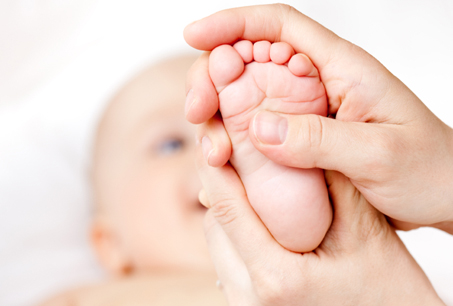Genetic test to prevent newborn babies going deaf recommended by NICE
A world-first genetic test to establish if a newborn baby is vulnerable to deafness if treated with a commonly used antibiotic, has been conditionally recommended by the National Institute for Health and Care Excellence (NICE) for use within the NHS.
This follows research led by Saint Mary’s Hospital, part of Manchester University NHS Foundation Trust (MFT), The University of Manchester and Manchester-based firm genedrive Plc on the Pharmacogenetics to Avoid Loss of Hearing (PALOH) study. Together with Manchester based genedrive plc, they developed the pioneering, rapid bedside genetic test which was piloted at MFT in 2022.
Using a cheek swab, the test can identify in 26 minutes whether a critically ill baby admitted to intensive care has a gene change that could result in permanent hearing loss if they are treated with a common emergency antibiotic, Gentamicin.
While Gentamicin is used to safely treat approximately 100,000 babies a year, one in 500 babies carry the gene change that can lead to permanent hearing loss when given the drug.
The new test means that babies found to have the genetic variant can be given an alternative antibiotic within the ‘golden hour’ which could save the hearing of 200 babies in England every year.
PALOH study lead, Professor Bill Newman, Consultant in Genomic Medicine at MFT and Professor of Translational Genomic Medicine at The University of Manchester, said: “We are delighted that NICE has conditionally recommended the use of the test, which will be used in routine clinical practice in maternity settings across the country.
“We piloted the device at MFT in 2020 for 11-months and during that period we tested 750 babies and detected the genetic variant in three babies. Since being rolled out within our services at Saint Mary’s Hospital in November 2022, we have prevented the hearing loss of one baby.
“Our experience of using this test has been very positive. It’s straight-forward, non-invasive and will have a huge impact on our patients’ lives. The test will make a real difference, helping to ensure babies are not going to lose their hearing for a preventable reason.”
The system was developed in close collaboration with Professor Newman, Associate Lead, Hearing Health Genomic Solutions at National Institute for Health and Care Research (NIHR) Manchester Biomedical Research Centre (BRC) and his team at Manchester BRC.
We are delighted that NICE has conditionally recommended the use of the test, which will be used in routine clinical practice in maternity settings across the country
The new swab test technique replaces a test that traditionally took several days and is the first use of a rapid point of care genetic test in acute neonatal care.
Evidence presented to the independent NICE committee from the PALOH study carried out in Manchester and Liverpool showed no statistically significant difference between the time to antibiotic treatment between standard care and when using the genedrive device. This suggests that introducing the test will not delay the time it takes to administer antibiotics.
Once in use, the NHS will collect further evidence to ensure the test can be put in place in a variety of different maternity settings. This additional evidence will also be scrutinised by the independent NICE committee as part of the full assessment.
David Budd, CEO of genedrive plc, said: We look forward to receiving the final NICE report and recommendations for the world’s first rapid point-of-care genetic test used to influence neonatal management in an acute care setting.”
Around 1,249 babies are born in England and Wales with the variant each year. At the moment, babies treated with gentamicin who go deaf are only discovered to have the genetic variant with DNA testing afterwards.
The estimated cost of treating hearing loss with a bilateral cochlear implant is around £65,000 in the first year.
Mark Chapman, interim director of Medical Technology at NICE, said: “Until now there has not been a test quick enough to ensure that newborn babies with a bacterial infection and the variant gene are treated with an appropriate antibiotic. Having this test available to NHS staff can avoid the risk of hearing loss in babies with the variant who need treatment with antibiotics. Hearing loss has a substantial impact on the quality of life of the baby and their family.
“The costs associated with hearing loss to the NHS are high, so driving an innovation like genedrive into the hands of health and care professionals to enable best practice can also ensure that we balance the best care with value for money, delivering both for individuals and society as a whole.”



